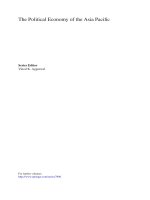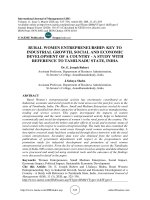Economic growth and economic development 568
Bạn đang xem bản rút gọn của tài liệu. Xem và tải ngay bản đầy đủ của tài liệu tại đây (124.53 KB, 1 trang )
Introduction to Modern Economic Growth
via creative destruction, it will create losers, in particular, the incumbents who are
currently enjoying profits and rents. Since we expect incumbents to be politically
powerful, this implies that many economic systems will create natural powerful opposition to the process of economic growth. Political economy of growth is partly
about understanding the opposition of certain firms and individuals to technological
progress and studying whether this opposition will be successful.
There is another, perhaps more surprising, implication of the analysis in this
subsection. This relates to the business stealing effect, which is closely related to
the replacement effect. The entrant, by replacing the incumbent, is also stealing
the business of the incumbent. The above discussion suggests that this business
stealing effect helps closing the gap between the private and the social values of
innovation. It is also possible, however, for the business stealing effect to lead to
excessive innovation by the entrant. To see the possibility of excessive innovation,
let us first look at total surplus gain from an innovation starting with the monopolist.
Suppose to simplify the discussion that the innovation in question is drastic, so that
if the entrant undertakes this innovation, it can set the unconstrained monopoly
price pM as given by (12.2) above. Therefore, the social value of innovation is Sb1I as
given by (12.5).
Proposition 12.4. It is possible that
ˆ I1 ,
Sb1I < π
so that the entrant has excessive incentives to innovate.
Ô
Proof. See Exercise 12.8.
Intuitively, the social planner values the profits made by the monopolist, since
these are part of the “producer surplus”. In contrast, the entrant only values the
profits that it will make if it undertakes the innovation. This is the essence of the
business stealing effect and creates the possibility of excessive innovations. This
result is important because it points out that, in general, it is not clear whether the
equilibrium will involve too little or too much innovation. Whether it does so or not
depends on how strong the business stealing effect is relative to the appropriability
effect discussed above.
554









